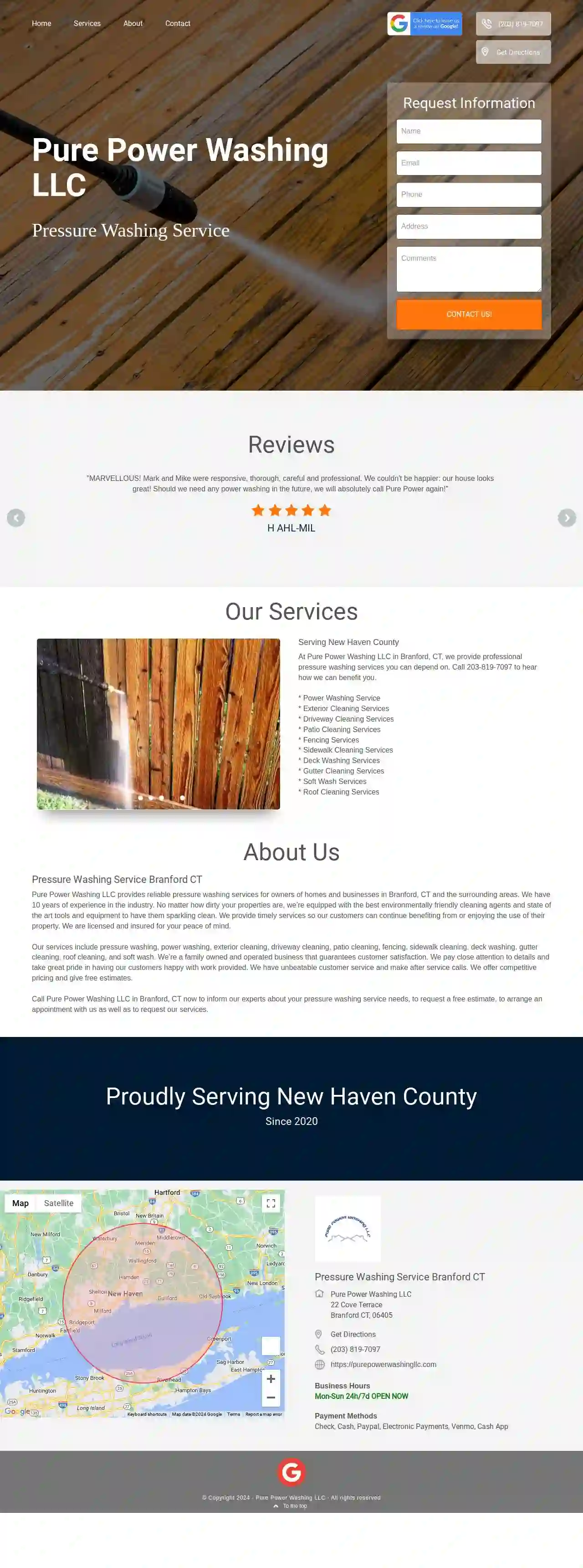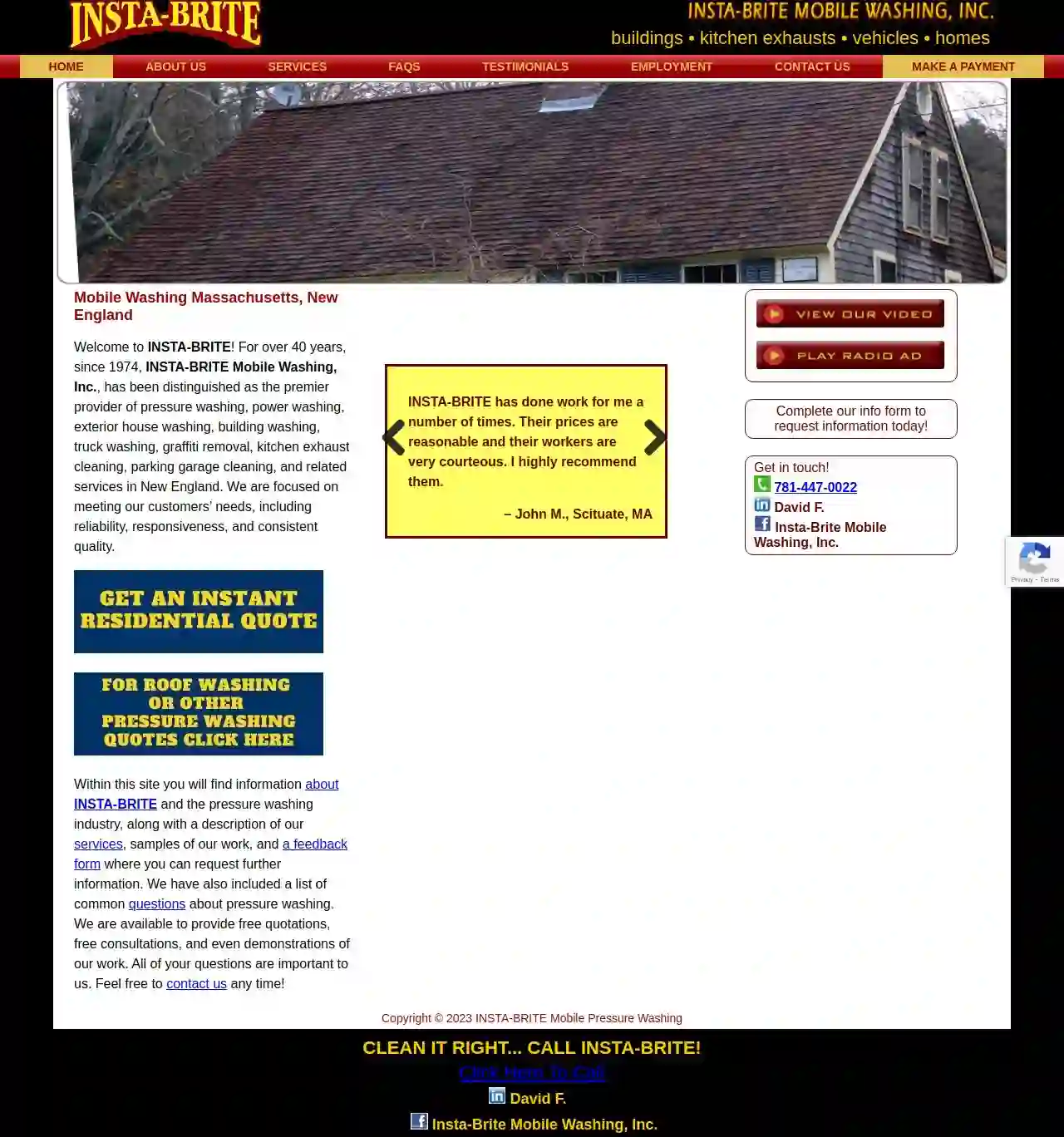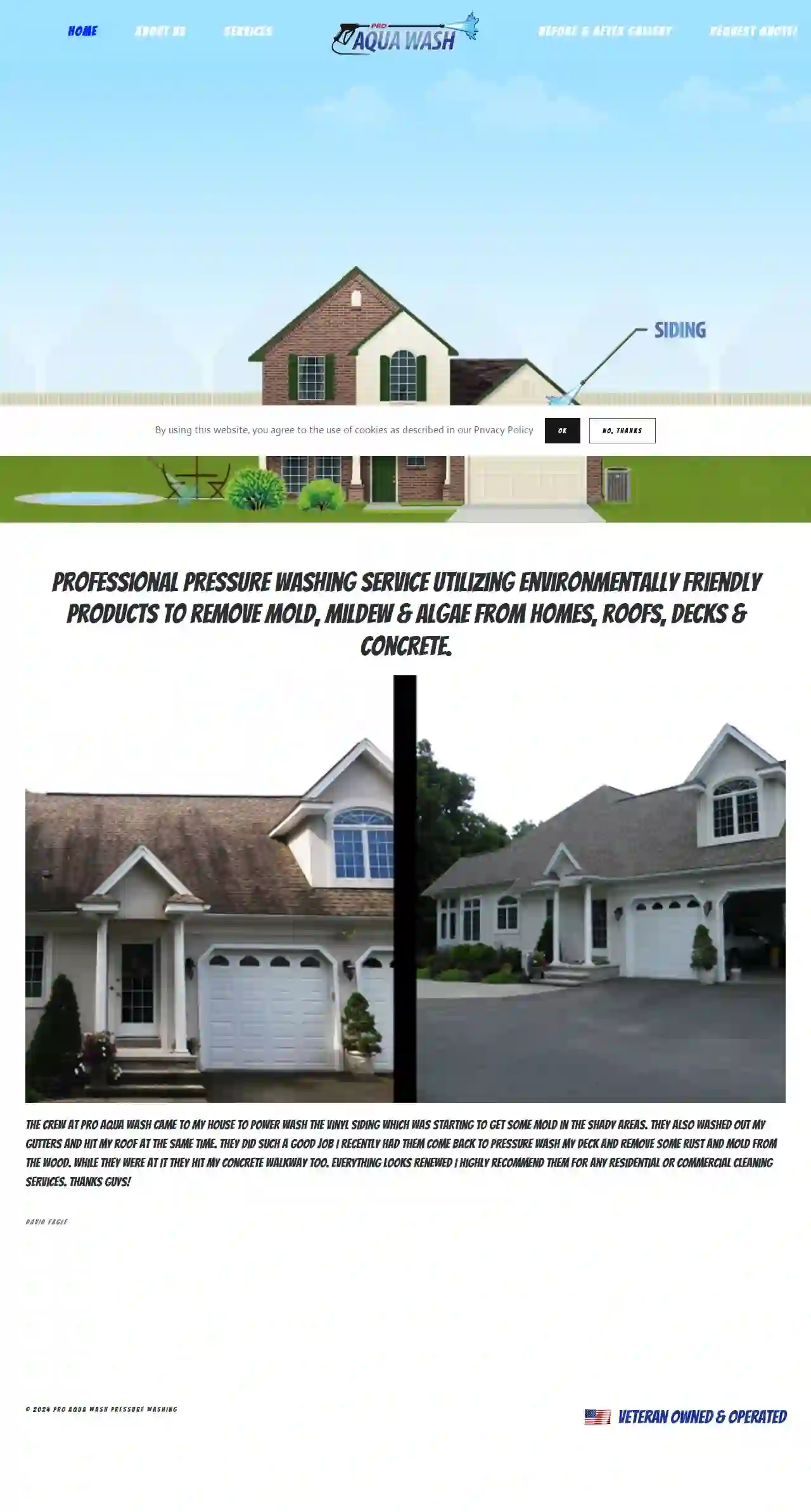Pressure Washing Hadley
Top Power Washing in Hadley
Receive 3 FREE Exterior Cleaning quotes for your project today! Compare profiles, reviews, accreditations, portfolio, etc... and choose the best deal.

Pure Power Washing LLC
532 reviews22 Cove Terrace, Branford, 06405, USPure Power Washing LLC is a family owned and operated business serving Branford, CT and the surrounding areas. We have 10 years of experience in the pressure washing industry and are dedicated to providing reliable and professional services. Our team utilizes environmentally friendly cleaning agents and state-of-the-art equipment to ensure your property is sparkling clean. We understand the importance of timely service, so we strive to minimize disruption to your daily routine. We are licensed and insured for your peace of mind. At Pure Power Washing LLC, we take pride in our attention to detail and commitment to customer satisfaction. We offer a wide range of services, including pressure washing, power washing, exterior cleaning, driveway cleaning, patio cleaning, fencing, sidewalk cleaning, deck washing, gutter cleaning, roof cleaning, and soft wash. We offer competitive pricing and free estimates. Contact us today to discuss your pressure washing needs and experience the Pure Power Washing difference!
- Services
- Why Us?
- Our Team
- Testimonials
- Gallery
Get Quote
Exclusive Pressure Washing
523 reviewsPembroke, MA, 9 Parker Rd., 02359, USExclusive Pressure Washing is a professional, licensed, and insured pressure washing business in Pembroke, MA. We provide high-quality cleaning solutions at affordable prices for residential and commercial properties. Our team has received extensive training in all aspects of exterior cleaning and prioritizes the needs of our clients. We offer a variety of pressure washing services, including house washing, roof cleaning, soft washing, driveway washing, sidewalk cleaning, rust removal, gutter brightening, brick & stucco cleaning, pool deck cleaning, fence washing, paver cleaning, mildew & moss removal, and commercial pressure washing. We are dedicated to providing superior customer service and high-quality work. Contact us today to schedule your pressure washing services and get a free estimate!
- Services
- Why Us?
- Accreditations
- Our Team
- Testimonials
- Gallery
Get Quote
Blue Power Wash
4.985 reviews155 Garfield Avenue, Stratford, 06615, USBlue Power Wash is Connecticut and Westchester Counties authority on residential and commercial Power Washing. We have been meticulously maintaining homes and businesses with our combined experiences of over 30 years in the power washing industry. Let our team of highly trained in-field service technicians remove mold, mildew and surface contaminants from your property and help maintain its value. RESIDENTIAL Let Blue Power Wash restore your homes exterior surfaces to like new condition! Our custom hot and cold-water pressure washing system is safe for cleaning all types of exterior surfaces including: vinyl, aluminum, painted, stained and even natural cedar. COMMERCIAL Keeping your business looking its best with a clean and inviting appearance is what Blue Power Wash specializes at. Successful businesses know that “Clean” sells. Grimy sidewalks, mold, mildew, filth and graffiti all detract from your organizations appearance. We service the following areas: Fairfield County, New Haven County, Westchester County. 100% Satisfaction Guarantee Check out why our customers choose Blue Mobile Wash for all their power washing needs.
- Services
- Why Us?
- Our Team
- Testimonials
- Gallery
Get Quote
Insta-Brite Mobile Washing, Inc.
4.789 reviewsN/A, USINSTA-BRITE Mobile Washing, Inc., has been a leading provider of pressure washing, power washing, and exterior cleaning services in New England since 1974. With over 40 years of experience, we've built a reputation for reliability, responsiveness, and consistent quality. We offer a wide range of services, including exterior building washing, house and condo washing, roof washing, sidewalk and storefront cleaning, brick and stone restoration, environmental fleet washing, parking garage cleaning, truck washing, graffiti removal, and paint stripping. We're committed to meeting our customers' needs and exceeding their expectations. Our team of skilled professionals uses the latest equipment and techniques to deliver exceptional results. We're proud to serve both residential and commercial clients throughout New England. We invite you to explore our website to learn more about our services, view samples of our work, and read what our satisfied customers have to say.
- Services
- Why Us?
- Accreditations
- Our Team
- Testimonials
- Gallery
Get Quote
Renew Power Washing LLC
4.952 reviewsMedford, USSouthern Oregon's #1 Power Washing and Soft Washing service! Turn to Renew Power Washing for all your exterior cleaning needs in Jackson and Josephine County! Our family and locally owned business provides roof moss treatment/removal, concrete cleaning, siding soft washing, graffiti removal, pool acid washing, wet media blasting, and much more! to keep your property completely clean. Renew can effectively remove dirt, grime, mold, mildew, from your property’s exterior surfaces, such as siding, roofs, decks, driveways, and sidewalks, to restore their original look and shine. A well-maintained and clean property can significantly increase its curb appeal and overall value. Renew can help you achieve this by removing all the dirt and stains that might make your property look dull and unattractive.Over time, dirt, grime, and other contaminants can build up on your property’s exterior surfaces, leading to permanent damage, such as discoloration, decay, and corrosion.Mold, mildew, and other bacteria that grow on your property’s exterior surfaces can be harmful to your health, especially if you have allergies or respiratory issues. Renew can eliminate these harmful substances, promoting a healthier and safer environment.Renew can save you time and effort that you would have spent scrubbing and cleaning your property’s exterior surfaces manually. With their professional equipment and expertise, they can quickly and efficiently clean your property, allowing you to focus on other important tasks.
- Services
- Why Us?
- Gallery
Get Quote
New England Pressure Cleaning
4.9167 reviews14 1st Ave, Blackstone, 01504, USWe are a team of professional pressure washing technicians who would like to help you feel proud of your property! Our Mission To enhance our clients’ properties through exceptional exterior cleaning services and refined customer service. Our Core Values Our Commitment to You We’re driven by providing exceptional services and experiences for you. We value our strong customer relations and are defined by how well we take care of them. Communication We value your time. Clear and concise communications by phone calls, automatic reminders, and reliable updates ensure awareness throughout your experience. Attention To Detail We notice the small things. Our field and office staff alike focus not only on the big picture but also on the small details. Empowerment We inspire and empower those around us. We extend respect and responsibility to everyone and lift each other up at every opportunity. We share knowledge freely and support each other to collectively reach our fullest potential. Ethicality We do what’s right. Customers choose us because they trust our company and people. We earn that trust by ensuring everything we do is reliable, consistent, and with the highest level of integrity.
- Services
- Why Us?
- Our Team
- Testimonials
- Gallery
Get Quote
Pro Aqua Wash
4.38 reviewsBoston, USPro Aqua Wash is a veteran-owned and operated pressure washing service dedicated to providing professional cleaning solutions for your home. We utilize environmentally friendly products to effectively remove mold, mildew, and algae from various surfaces, including roofs, houses, decks, and concrete. Our commitment to quality and customer satisfaction is evident in our exceptional before-and-after results. We strive to exceed expectations and deliver a sparkling clean finish for your property.
- Services
- Why Us?
- Testimonials
- Gallery
Get Quote
Cascade ProBuild / Cascade ProWash, LLC
4.932 reviews665 A Street, Ashland, 97520, USCascade ProWash is Oregon's leading expert in residential and commercial exterior cleaning. We utilize modern "soft-washing" techniques to clean most surfaces with reduced pressure, protecting your property while delivering superior results compared to traditional pressure washing. Our commitment to excellence is reflected in our free, in-person consultations and written quotes. We'll guide you through our process, scope of work, and preparation steps to ensure a smooth and professional experience. Fully insured and trained on industry-leading processes, our team is equipped to clean various exterior surfaces, including asphalt shingles, metal roofing and siding, concrete, brick, wood, flagstone, and more. We guarantee your satisfaction. We strive to set clear expectations and, upon request, even provide demonstrations before service. Our goal is to earn 5-star reviews with every client.
- Services
- Why Us?
- Testimonials
- Gallery
Get Quote
Even Flow Pressure Washing
553 reviewsBoston, USAt Even Flow Pressure Washing, we understand that protecting the valuable investment you've made in your roof and home is important. Cleaning your roof or the painted surfaces prolongs their life expectancy and is a much less expensive option than having to replace the roof, repaint your house, or replace your siding. Roof washing was invented in 1992 and has been extending the lives of roofs ever since. For a fraction of the cost of a new roof, we can keep your roof looking brand new (without pressure), but more importantly, the integrity of your roof will be extended. We use low pressure washing techniques to remove the black streaks, algae, lichen and moss from your roof, a process that can help your roof last up to 10 years longer. Learn More Safe for Pets & PlantsWe combine a low pressure washing system with biodegradable products that will not hurt your plants or animals. With Even Flow Pressure Washing, dirt and moss don't stand a chance. Learn More Exterior Washing ServiceWhile power washing will remove dirt and grime, it can also permanently damage your siding, screens, gutters, and roofing materials. In the wrong hands, a power washer will leave streaks and do more harm than good.Even Flow Pressure Washing provides a more effective and safer alternative to homeowners in the Worcester/Middlesex area. Learn MoreChoose low-pressure washing from Even Flow Pressure Washing and your house will be the envy of the neighborhood.
- Services
- Why Us?
- Our Team
- Testimonials
- Gallery
Get Quote
Refresh Pressure Washing LLC
539 reviewsNot specified on the website., Medford, 08055, USRefresh Pressure Washing LLC is a trusted provider of professional pressure washing and soft washing services for residential and commercial properties in Medford, New Jersey, and surrounding areas. Founded in 2022, the company is dedicated to providing top-quality cleaning solutions that help clients maintain clean and attractive properties. They understand the importance of time and budget, offering flexible scheduling, competitive pricing, and free quotes for all services. Their team of highly skilled professionals is committed to exceptional customer service and exceeding expectations with every project. Refresh Pressure Washing LLC aims to deliver outstanding results that leave properties looking and feeling refreshed.
- Services
- Why Us?
- Our Team
- Testimonials
- Gallery
Get Quote
Over 60,241+ Cleaning Businesses on our platform
Our cleaning services operate in Hadley and surroundings!
CleaningMatch has curated and vetted Top Cleaning Contractors near Hadley. Find the most trustworthy contractor today.
Frequently Asked Questions About Pressure Washing
- Online Reviews: Check online reviews on platforms like Google, Yelp, and Facebook to gauge customer satisfaction and service quality.
- Experience and Expertise: Look for companies with a proven track record and experience in pressure washing various surfaces.
- Licensing and Insurance: Ensure the company is licensed and insured to protect you from liability in case of accidents or damage.
- Equipment and Techniques: Inquire about the company's equipment and techniques to ensure they use appropriate pressure levels and cleaning solutions for different surfaces.
- Quotes and Pricing: Obtain detailed quotes from multiple pressure washing companies and compare their pricing. Make sure the quotes are transparent, outlining all services and costs.
- Professionalism and Communication: Choose a company that is responsive, provides clear communication, and demonstrates professionalism in its interactions.
- Wear Protective Gear: Wear safety glasses, closed-toe shoes, and long pants to protect yourself from flying debris and water spray.
- Never Point the Nozzle at Yourself or Others: High-pressure water can cause serious injuries. Always point the nozzle away from yourself, others, and pets.
- Use Caution on Ladders: If working on a ladder, ensure it is stable and secure. Avoid overreaching or leaning too far to one side.
- Be Mindful of Electrical Hazards: Keep water away from electrical outlets, wiring, and appliances.
- Follow Manufacturer's Instructions: Always read and follow the pressure washer manufacturer's instructions for safe operation and maintenance.
- 0-degree Nozzle: Produces a highly concentrated, powerful jet of water for removing stubborn stains or stripping paint. Use with caution as it can damage surfaces easily.
- 15-degree Nozzle: A versatile nozzle for cleaning concrete, brick, and other hard surfaces. Provides a good balance of pressure and coverage.
- 25-degree Nozzle: A wider spray pattern for cleaning delicate surfaces like siding or fences.
- 40-degree Nozzle: A very wide spray pattern, ideal for rinsing or applying cleaning solutions.
- Soap Nozzle: A low-pressure nozzle designed specifically for applying cleaning solutions.
- Rotary Nozzle: Also known as a turbo nozzle, it produces a rotating, high-impact spray for tackling tough stains and grime.
- Hard Surfaces: Pressure washing is often successful in removing graffiti from hard surfaces like brick, concrete, or metal.
- Delicate Surfaces: For delicate surfaces like wood or painted surfaces, a gentler approach using specialized graffiti removal products and techniques may be necessary.
- Professional Graffiti Removal: For stubborn or extensive graffiti, consider hiring a professional graffiti removal service. They have specialized equipment, cleaning solutions, and experience in dealing with various types of graffiti.
How do I find a good pressure washing service?
Utilize online directories like CleaningMatch to find and compare qualified pressure washing services in your area.
What are some safety precautions to take when pressure washing?
Prioritizing safety when pressure washing protects you and others from potential injuries or accidents.
What are the different types of pressure washer nozzles?
Choose the appropriate nozzle based on the cleaning task and the type of surface being cleaned. Consult the pressure washer manual or a professional pressure washer for guidance.
Can pressure washing remove graffiti?
If you're attempting DIY graffiti removal, always test the cleaning solution and pressure washing technique on an inconspicuous area first to avoid damaging the surface.
How do I find a good pressure washing service?
- Online Reviews: Check online reviews on platforms like Google, Yelp, and Facebook to gauge customer satisfaction and service quality.
- Experience and Expertise: Look for companies with a proven track record and experience in pressure washing various surfaces.
- Licensing and Insurance: Ensure the company is licensed and insured to protect you from liability in case of accidents or damage.
- Equipment and Techniques: Inquire about the company's equipment and techniques to ensure they use appropriate pressure levels and cleaning solutions for different surfaces.
- Quotes and Pricing: Obtain detailed quotes from multiple pressure washing companies and compare their pricing. Make sure the quotes are transparent, outlining all services and costs.
- Professionalism and Communication: Choose a company that is responsive, provides clear communication, and demonstrates professionalism in its interactions.
Utilize online directories like CleaningMatch to find and compare qualified pressure washing services in your area.
What are some safety precautions to take when pressure washing?
- Wear Protective Gear: Wear safety glasses, closed-toe shoes, and long pants to protect yourself from flying debris and water spray.
- Never Point the Nozzle at Yourself or Others: High-pressure water can cause serious injuries. Always point the nozzle away from yourself, others, and pets.
- Use Caution on Ladders: If working on a ladder, ensure it is stable and secure. Avoid overreaching or leaning too far to one side.
- Be Mindful of Electrical Hazards: Keep water away from electrical outlets, wiring, and appliances.
- Follow Manufacturer's Instructions: Always read and follow the pressure washer manufacturer's instructions for safe operation and maintenance.
Prioritizing safety when pressure washing protects you and others from potential injuries or accidents.
What are the different types of pressure washer nozzles?
- 0-degree Nozzle: Produces a highly concentrated, powerful jet of water for removing stubborn stains or stripping paint. Use with caution as it can damage surfaces easily.
- 15-degree Nozzle: A versatile nozzle for cleaning concrete, brick, and other hard surfaces. Provides a good balance of pressure and coverage.
- 25-degree Nozzle: A wider spray pattern for cleaning delicate surfaces like siding or fences.
- 40-degree Nozzle: A very wide spray pattern, ideal for rinsing or applying cleaning solutions.
- Soap Nozzle: A low-pressure nozzle designed specifically for applying cleaning solutions.
- Rotary Nozzle: Also known as a turbo nozzle, it produces a rotating, high-impact spray for tackling tough stains and grime.
Choose the appropriate nozzle based on the cleaning task and the type of surface being cleaned. Consult the pressure washer manual or a professional pressure washer for guidance.
Can pressure washing remove graffiti?
- Hard Surfaces: Pressure washing is often successful in removing graffiti from hard surfaces like brick, concrete, or metal.
- Delicate Surfaces: For delicate surfaces like wood or painted surfaces, a gentler approach using specialized graffiti removal products and techniques may be necessary.
- Professional Graffiti Removal: For stubborn or extensive graffiti, consider hiring a professional graffiti removal service. They have specialized equipment, cleaning solutions, and experience in dealing with various types of graffiti.
If you're attempting DIY graffiti removal, always test the cleaning solution and pressure washing technique on an inconspicuous area first to avoid damaging the surface.